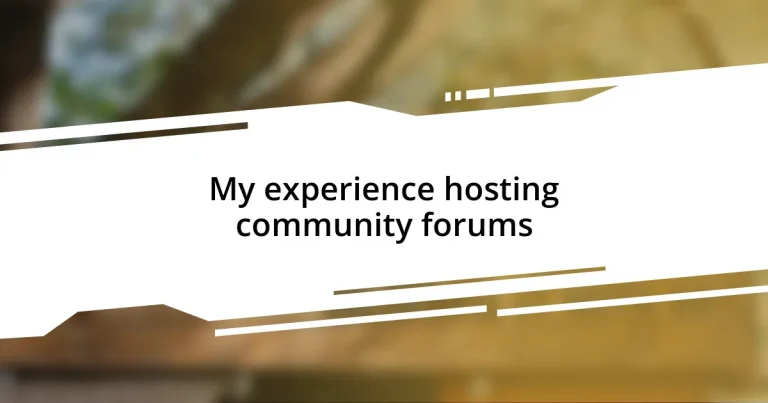Key takeaways:
- Establishing clear guidelines and actively participating in discussions fosters a constructive and inviting community environment.
- Community engagement strengthens connections, promotes personal growth, and encourages collective action through diverse perspectives.
- Utilizing effective management tools and strategies, such as regular themed discussions and welcoming new members, boosts participation and enhances member experience.
- Measuring success through both engagement metrics and qualitative feedback ensures the community evolves and meets its members’ needs.
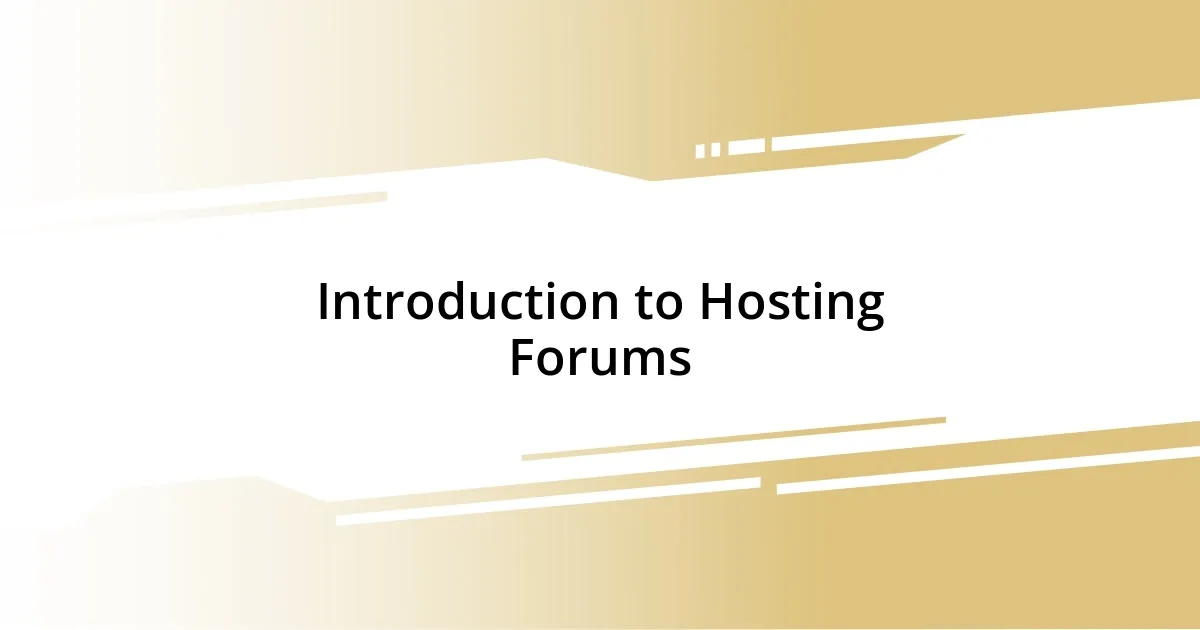
Introduction to Hosting Forums
Hosting community forums can feel like diving into a vibrant conversation with strangers who soon become friends. I remember my first experience; I was excited yet nervous, unsure if I could create an inviting space for diverse voices. Have you ever wondered how a simple discussion thread can spark meaningful connections? It’s all about fostering an environment where everyone feels valued.
As I navigated the early stages of hosting forums, I learned that setting clear guidelines was crucial to keeping discussions constructive. Imagine walking into a room filled with passionate individuals but lacking direction—chaos is bound to arise. By establishing ground rules, I found that members were more willing to engage openly and share their views without hesitation.
Moreover, I discovered the power of actively participating in the conversations. One time, I shared a personal story related to a forum topic, and the floodgates opened; others followed suit. It was exhilarating to see how a bit of vulnerability encouraged others to open up. How can we nurture such openness in online spaces? By being relatable and authentic ourselves, we pave the way for others to share their stories too, creating a rich tapestry of experiences.
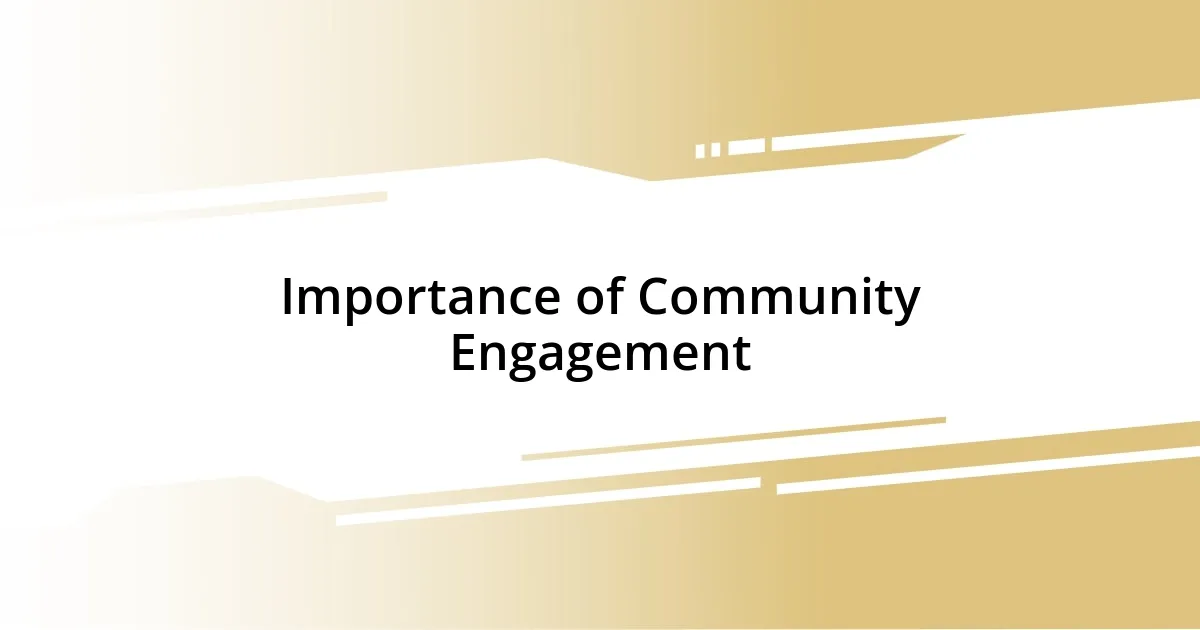
Importance of Community Engagement
Engaging with a community is vital because it cultivates a sense of belonging among its members. I vividly recall a discussion where someone shared their struggle with mental health. The responses were overwhelming—people offered support, shared their stories, and created a safe space for vulnerability. This not only strengthened connections but also reminded everyone that they are not alone in their experiences.
Active participation from members elevates discussions and allows for a richer exchange of ideas. During one forum session, I posed a question about work-life balance, and the variety of responses illuminated perspectives I hadn’t considered. It was like peering through different lenses, and I realized how community engagement can lead to personal growth, as we learn from each other’s insights.
Ultimately, the strength of a community lies in its collective voice. I remember a forum where we were collectively brainstorming solutions for a local issue. The collaboration sparked creativity, leading to actionable plans that we implemented together. Witnessing this synergy in action reaffirmed my belief that community engagement is not just important; it’s transformative.
| Benefits of Community Engagement | Examples from Experience |
|---|---|
| Fosters Connection | Sharing personal stories leads to stronger relationships among members. |
| Promotes Diversity of Thought | Different perspectives enhance the richness of conversations and ideas. |
| Encourages Collective Action | Communities can work together to resolve shared challenges effectively. |
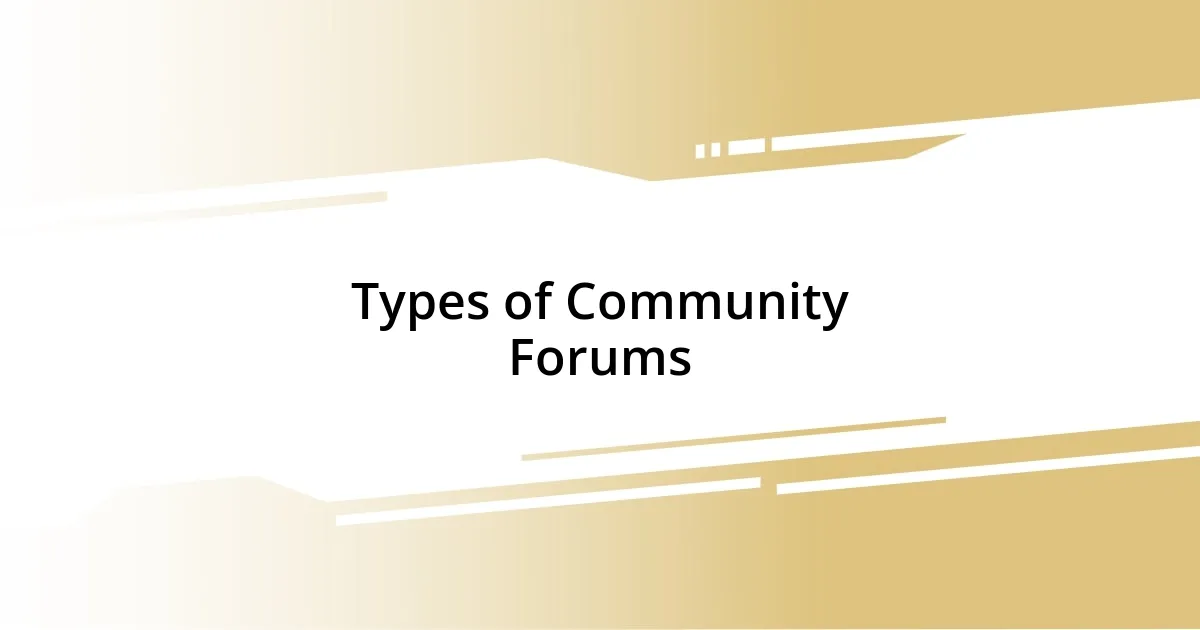
Types of Community Forums
When it comes to community forums, I’ve encountered various formats that cater to different needs and interests. Each type brings its unique flavor to the conversation, fostering engaging dialogues. I remember setting up a Q&A forum; it was thrilling to see community members rally to answer questions, especially when they shared their expertise and experiences. There’s something incredibly rewarding about creating a space where knowledge flows freely, and participants feel empowered to contribute.
Here are some common types of community forums:
- Discussion Boards: These allow members to initiate and participate in ongoing conversations about various topics.
- Q&A Forums: Members ask questions, and the community responds, promoting knowledge sharing and collaboration.
- Support Groups: These forums focus on providing emotional and practical support for members dealing with similar challenges.
- Event Pages: These are dedicated to organizing community events, fostering connections in person.
- Resource Sharing: In these spaces, members share articles, tools, and other valuable resources relevant to the community’s interests.
Engaging in these different types of forums has not only broadened my understanding of community dynamics but has also enriched my personal growth through diverse interactions. For instance, the support group I once hosted felt like a safe harbor during turbulent times for many, including myself. It transformed into a healing space where we could all express our fears and hopes, and I learned the vital role forums play in connecting people during challenging moments.
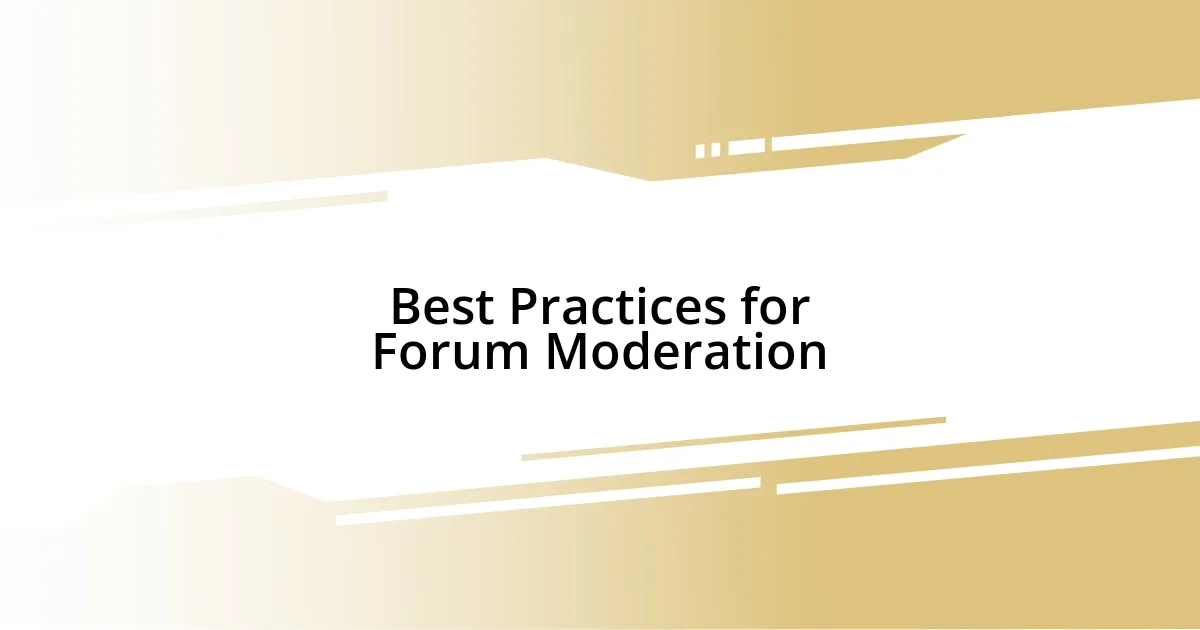
Best Practices for Forum Moderation
One of the best practices for forum moderation is establishing clear guidelines that outline acceptable behavior. When I first started moderating, I remember feeling overwhelmed by the diverse personalities in our community. To ease this, I crafted a set of rules that emphasized respect and constructive criticism. I laid the foundation for a respectful conversation, and it worked wonders—people began to engage more positively, knowing what was expected.
Another essential aspect is being present and responsive. There were moments when discussions spiraled or members felt unheard. I made it a point to check in regularly, acknowledging contributions and addressing any concerns promptly. This not only mitigated potential conflicts but also fostered an open atmosphere where members felt valued. How many times have you witnessed a conversation go south because no one stepped in? I learned firsthand that timely moderation prevents issues from escalating and nurtures a supportive environment.
Lastly, transparency in decision-making is crucial. When community members saw how I handled various situations—like enforcing rules or facilitating disputes—they appreciated being kept in the loop. I often shared the reasoning behind my decisions in more intense discussions. It was fascinating to see how trust blossomed as a result. Have you ever felt more connected to a group when you knew the “why” behind actions? I certainly did, and it reinforced my commitment to creating a welcoming space.
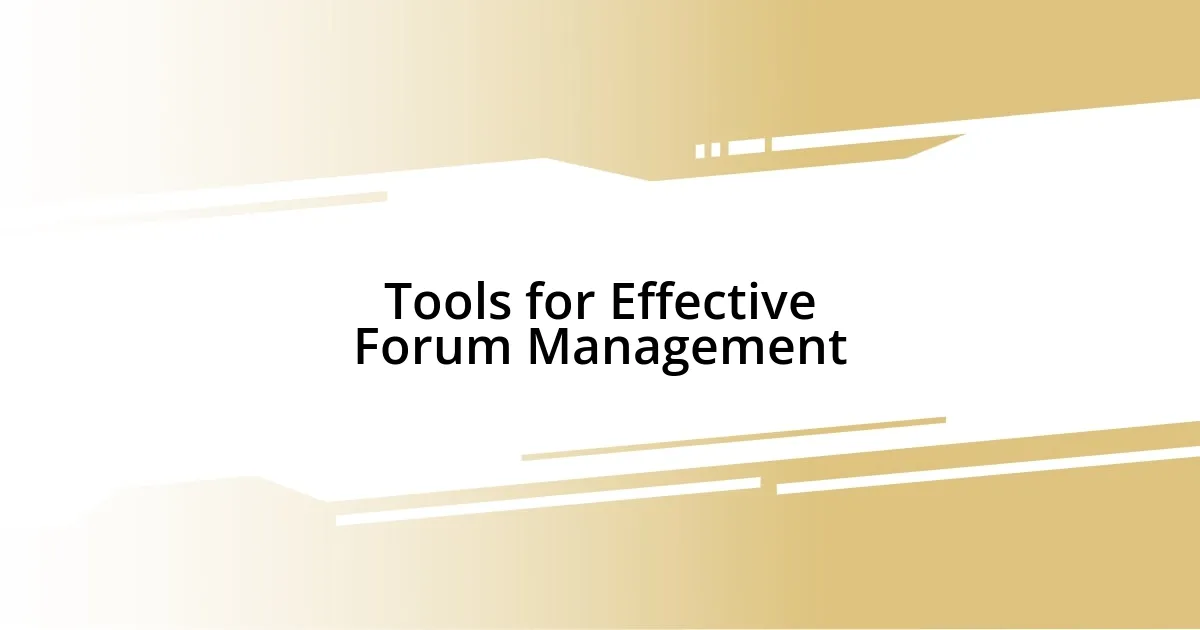
Tools for Effective Forum Management
Effective forum management requires the right tools to keep everything running smoothly. I’ve found that using a reliable platform, such as Discourse or Vanilla Forums, can greatly enhance user experience. For instance, during an active discussion about local wildlife conservation, Discourse’s tagging and notification features helped members engage in real time, fostering a lively atmosphere that I thoroughly enjoyed.
Another crucial tool is analytics. Monitoring engagement metrics provides invaluable insights into what your community values. I remember diving into our forum analytics and discovering that certain topics consistently generated excitement. Armed with this data, I tailored our discussions accordingly, leading to increased participation and a deeper connection among members. Have you ever noticed how tuning into what resonates can transform participation levels? That’s a powerful realization.
Don’t underestimate the importance of moderation tools, either. Features like post approval workflows or automated moderation can help maintain decorum without feeling intrusive. I learned this the hard way when a heated debate erupted unexpectedly—responses were flying around, but with my moderation tools in place, I managed to guide the conversation back on track quickly. It was a relief to see members appreciating the structure, even in chaotic moments. Isn’t it fascinating how the right tools can turn a potential crisis into a constructive dialogue?
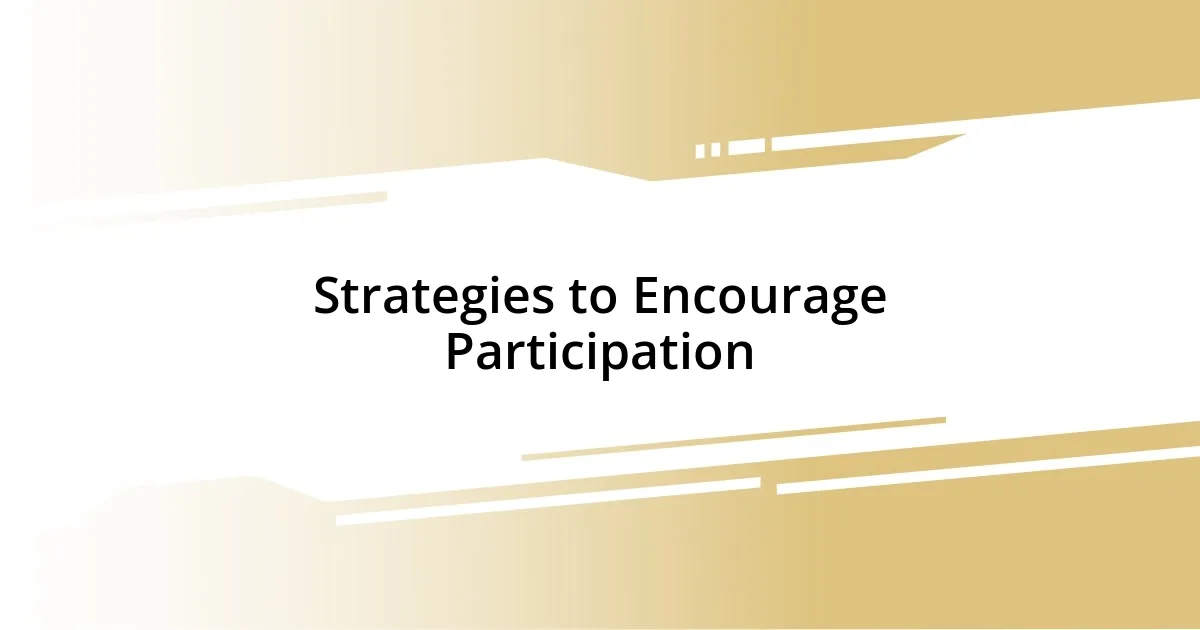
Strategies to Encourage Participation
To encourage participation, I found it immensely beneficial to host regular themed discussions. I vividly remember the excitement during our monthly photography challenge; it created a buzz that drew in both seasoned photographers and novices alike. By offering a focused topic, I could see members come together, sharing their insights and feedback. Isn’t it interesting how a clear theme can transform the dynamics of a conversation?
Incentives can also play a key role in fostering engagement. I once organized a series of contests with small rewards, like shout-outs or digital badges. The thrill of competing encouraged even the quietest members to share their work, revealing talents I hadn’t seen before. Seeing those faces light up with pride was so rewarding! Have you ever noticed how a little recognition can push someone out of their comfort zone?
Lastly, creating a welcoming environment through personal touch can work wonders. I made it a practice to personally welcome new members with a brief message, asking about their interests. It was heartwarming to receive replies that not only thanked me but also sparked further conversations. How wonderful it is to feel seen in a large community, right? That’s the kind of atmosphere we should all strive for—where everyone feels they belong and have something meaningful to contribute.

Measuring Success of Your Forums
To measure the success of your forums, I prioritize looking at engagement metrics like post frequency and member interactions. I vividly recall one month when our forum experienced a spike in activity—members were posting, replying, and sharing thoughts like never before. That surge was not just a number; it felt electric, like I could almost sense the excitement through my screen. Have you ever felt that rush of vibrant conversation in your community?
Another aspect I find invaluable is member retention. Tracking how many people return and actively participate over time really highlights their connection to the community. One year, after implementing feedback-driven changes, we saw a consistent rise in our return members. It warmed my heart to realize that our efforts were making a tangible difference. Reflecting on that, isn’t it rewarding to see your community evolve and flourish because of what you’ve created together?
Lastly, I believe qualitative feedback is just as crucial as quantitative data. I’ve taken the time to ask members about their experiences—what they love and what they’d like to see improve. There was a point when a few honest conversations led to restructuring our forum categories, which in turn fostered more focused discussions. It’s amazing how simply listening can reshape the entire landscape of your forum. Have you ever gathered insights that sparked a revolutionary idea for your community?












